- Home
- Edward Lee
The Black Train Page 13
The Black Train Read online
Page 13
A quick look into Cusher’s showed him a full house and full bar. Shit. I’ve got to get a seat at the bar, otherwise I won’t get to talk to her…The lunch crowd looked heavy everywhere, so he decided to kill some time roving in and out of some knickknack shops, tourist crannies, and the Gast Civil War Museum. On the corner, then, he noticed the bookstore. Might as well go in now and see if I can run down J.G. Sute…
A bell jingled when he pushed through the door. It was a small, tidy shop, with more tourist buttons, shirts, and related trinkets than books. Several browsers milled about but none of them could be Sute. Jiff said he was close to sixty…Collier shouldered into a cove and found it full of Civil War tomes, mostly pricey picture books. Wouldn’t mind picking up a few books on Gast, though, he told himself. One shelf was filled end to end with the same title: From Branch Landing to Gast: A Local History. The author was J.G. Sute, but, No way! Collier rebelled. The downsized hardcover was fifty dollars. Another book, more like a trade pamphlet, showed the title, The East Tennessee and Georgia Railroad Company, also by Sute. The same title filled the next shelf: Harwood Gast: A Biography of Gast’s Most Sinister Figure. It was very thin, but, That’s more like it, he thought of the five-dollar price tag. It was not a quality printing, and the photo-plate section looked xeroxed, but as Collier flipped through he found some curious tintypes of the town in the 1850s and through to the end of the war. One plate, of Gast himself, Collier found chilling in the way the subject’s eyes seemed to burn through the photo’s fuzzy surroundings. The well-dressed, mutton-chopped plantation baron looked exactly like the huge portrait in the atrium. Another plate showed a sturdy wooden building with the text below: THE FIRST BANK OF GAST. I was just there, Collier thought. An opposite daguerreotype was devoted to MR. WINDOM FECORY: HARWOOD GAST’S CONTROVERSIAL BANKING OFFICER. What could be controversial about him? Collier wondered with a smirk, but the more he appraised the picture—a wiry, thin-faced man with a peculiar nose—the creepier he found the image. One surprisingly clear plate showed Mrs. Penelope Gast standing elegantly beside one of the house’s entrance pillars; she looked demure and beautiful in an elaborate bustle dress and corsetlike top. The cleavage in the lowcut top couldn’t have been more apparent. What a rack! Collier admitted.
The little book hooked him. I’m buying this, he knew, but as an author himself he flipped instinctively to the copyright page, to see who the publisher was. Not a good sign, but I’m still buying it, he resolved. The publisher was listed as J.G. Sute Publications.
“Let me guess what you’re thinking,” a crisp yet deep baritone Southern voice surmised. Sun from the front window reduced a wide figure to shadow. “You’re thinking that it must not be any good since it’s self-published.”
“I—”
“But I can assure you, sir, that the author has no resort since all respectable publishing houses found the subject matter too controversial.”
Collier, caught off guard, stepped aside and found himself facing a short, obese man in a tweed sports jacket with patches on the elbows. Balding, stout-faced, but with eyes that seemed serious and credible…and a white-gray mustache and Vandyke that reminded Collier of Colonel Sanders. It was the same man on the book’s back cover. “Oh, you must be J.G. Sute. I’ve actually been looking for you. I’m Justin—”
“Justin Collier,” the deep voice replied. “When a celebrity comes to town, I’m the first to know. Very pleased to meet you.” He offered a soft but large hand. “I have seen your beer show several times but I’ll have to admit, I’m more of a wine and scotch man myself. And you say…you’ve been looking for me?”
“Yes, yes,” Collier returned and quickly got the Internet printout from his wallet. “It’s actually this piece you wrote that got me here.”
Sute looked at it and seemed pleased. “I do a lot of freelancing for local papers and the tourist Web sites. Oh, you mean my reference to Cusher’s?”
“Right. And I’d just like to thank you because their lager turned out to be just what I needed to finish my current book.”
Now the wide, squat man seemed to grow a few inches from the compliment. “I’m flattered my little piece could be of service. So…if you don’t mind my asking, who’s the publisher for your book?”
“Random House,” Collier said.
Mr. Sute’s extra inches dropped back down very quickly. “Well, regrettably, I’ve never been published by so lofty a house but”—he pointed to the fifty-dollar edition—“that one there is my pride and joy. Published by Seymour and Sons, in Nashville. It’s sold a thousand copies so far.”
Collier got the gist. The poor sap’s just a hack and I’m rubbing Random House in his face. He decided to bite the bullet, and he took a copy down. “I planned on buying that one, too. Would you sign it for me?”
Sute blustered. “I’d be honored.”
“I’ve only been here a day but I’ve become enthralled by all the local color. Harwood Gast and his railroad, for instance.”
“It’s quite a story, and as I was saying previously, a little too harsh a story for the big publishers. I’ve had to publish several on my own for the same reason—”
“Too harsh?”
“—and I don’t think I’m being conceited to say that I am the only true expert on the local color and history of this town. All my works are based on original letters, photos, and estate archives. This one, for instance”—his finger gestured another slim paperback, entitled Letters of Evidence: The Epistemological Record of Gast, Tennessee—“and it’s only five dollars.”
Collier took down a copy. “I’ll be digging into all of these soon, thanks. But I was also wondering, since you write for tourist and dining sites, are there any other brew pubs or regional taverns in the area? What I’m looking for are more places that might specialize in regional beers based on old recipes.”
Sute seemed downtrodden that he could offer no more expertise. “Not really, I’m afraid. The South is more known for whiskey and mashes. There are a few taverns in Chattanooga that brew their own beer but I think it’s more faddish than authentic.”
Well, I guess I knew it was too good to be true. But at least Cusher’s had been a stunning success…And I suppose I owe part of its discovery to him.
“I wish I could be more help.”
“You’ve been quite a bit of help already, Mr. Sute. If it hadn’t been for your piece, I might never have found out where Cusher’s is located.” Collier supposed buying several of the man’s books—especially the fifty-dollar job—was gratitude enough. “Let me take these to the cashier, and then you can sign them.”
Sute gushed behind Collier, and eventually signed the tomes with a confident expression. Maybe they’d be interesting, maybe not. But then something ticked in Collier’s ear.
“You said this one book was too harsh for a New York publisher?”
“That and a number of others. Not even the local college presses would touch them, even though these are the only books ever written on this aspect of town history. And it’s an important history, too—there are dozens of books on the railroads of Chattanooga during the war, yet the most unusual railroad of the same period was the one that Harwood Gast built. My book details, among other things, Gast’s actual use of the railroad, which was…atypical.”
The comment seemed bizarre. “I presume that any railroad during a war is used chiefly to transport troops and supplies.”
“Um-hmm, but not this railroad, Mr. Collier—and my sources are firsthand evidence. No supplies, and not one single soldier was ever transported on Gast’s railroad.” Sute nodded sternly, and indicated the books under Collier’s arm. “The railroad’s actual use is touched upon in those books, however. I hope you find them interesting.”
What is it with people in the South? Collier wondered, aggravated. They deliberately evade the point. The best storytelling ploy, keep the listener in suspense. “Come on, Mr. Sute. What was the railroad used to transport?”
“Captives,” th
e obese man said.
“Oh, you mean they used it to take Union prisoners to detention camps? Andersonville and all that?”
“Not…Andersonville. That was on the other side of Georgia, and, yes, that’s where most of the captured Union troops were sent. But I’m afraid Gast’s railroad had an exclusive utility: to transport captive civilians. Women, children, old men. The innocent. It’s unfortunate that the complete story was never published.”
“Yes,” Collier added, “because it was too harsh. You told me. But you’ve got my curiosity going. So…Gast transported captured Northern civilians on the railway—do I have that right?”
Sute nodded.
“And I guess they were transported to a separate detention camp…”
“In a sense, you could say that. It’s a harrowing story, Mr. Collier, and probably not one you’d like to hear in detail on a beautiful day such as this. You’re a celebrity, after all, and it’s wonderful to have you in our humble town. I’d hate for such a story to spoil your stay.”
Collier smiled. “It’s some ’ghost train’ or something, then, right?”
A curt “No.”
This guy is ticking me off now, Collier thought.
Sute shed some of the grim cast, and raised a finger. “But if you like ghost stories, I’ll admit, a few of those are touched on, too. Some nifty little stories about the house.”
The house, Collier stalled. The Gast House. “I knew it all along! So the inn’s a haunted house. I knew Mrs. Butler was bluffing…”
J.G. Sute’s broad face turned up in a grin. “Well, I’m on my way to lunch now, Mr. Collier, but if you stop by tomorrow I’ll tell you some of the tales.”
Collier wanted to bang the books over his head. “Come on, Mr. Sute. Tell me one story about the house. Right now.”
Sute drew on a pause—of course, for effect. “Well, without sounding too uncouth, I can tell you that many, many guests of the Gast House—dating back quite a spell—have reported a curious…influence. A, shall we say, libidinous one.”
Collier squinted at the thick mustachioed face. “Libidinous—you mean, sexual?”
The schoolmarmish cashier frowned over her glasses. “Please, J.G.! Don’t start getting into all that now. We want Mr. Collier to come back, not stay away forever!”
Mr. Sute ignored the crotchety woman. “I’ll only say that the house seems to have a sexual effect on certain people who happen to stay there. One of whom was my grandfather.”
The cashier was fuming, but Collier couldn’t let it go. “A sexual effect in what way?”
Sute’s shoulder hitched up once. “Some people have experienced an inexplicable…amplification of their…sexual awareness.”
Amplification. Sexual awareness. Collier’s mind ticked like a clock. “You’re saying that the house makes people h—”
Before Collier could say “horny,” Sute polished up the inference by interrupting: “The house will incite the desires of certain people. Especially persons who are otherwise experiencing a decline in such desires. My grandfather, for instance, was in his eighties when he stayed there.” Sute smiled again, and whispered, “He said the place gave him the sex drive of a twenty-year-old.”
Collier had to make a conscious effort to prevent his jaw from dropping.
Just like me, from the second I set foot in the place…
“Mr. Sute? I’d be honored if you’d allow me to treat you to lunch,” Collier said.
But why was Collier so fascinated? He didn’t even try to discern it. Sute’s strange comment about “amplified” sexual desire, and the fact that Collier had experienced exactly that, could have just been timeliness and coincidence—in fact, he felt sure it was.
Still…
The house was having some effect on him—probably due to his boredom and angst. They walked around a busy corner, Sute still ego-stroked that this “celebrity” was interested in his stories enough to actually buy him lunch. Two birds with one stone, Collier thought; J.G. Sute was all too happy to lunch at his favorite local restaurant: Cusher’s.
“Would you mind if we sat at the bar?” Collier asked when he noticed two empty stools. Better yet, Dominique was tending the taps, cuter than ever in her dark, shiny hair and bosom-hugging brewer’s apron. Collier looked up hopefully, and when she smiled and waved, he could’ve melted. Oh, man. The perfect woman…
“The bar’s fine with me,” Sute said, but just then—
You fuckers! Collier’s thought screamed. Get the fuck away from those stools!
A middle-aged couple beat them to the stools.
Collier walked to the end of the bar. “Hi,” he said to Dominique.
“I’m glad you came,” she said. Caramel irises sparkled. “No room at the bar right now, but there’s plenty of seats in the dining room.”
Collier stammered, “I was really hoping to get to talk to you—oh, and I have that release form.”
“Great. When you’re done eating, just come by.” Dominique glanced at Collier’s unlikely lunch guest. “Getting an earful, huh?”
“Well…”
“Good old J.G. will keep you enthralled,” she said. “Last night you did seem pretty interested in some of the town’s folklore. Mr. Sute’s the one to talk to about that.”
“So I gather. But—” Shit! “I really wanted a seat at the bar.”
Her eyes thinned, and she smiled. “I won’t fly away.”
Christ, I really dig her, Collier thought. A hostess seated them in the dining room. I’m the one who invited this big dolt to lunch, so live with it. I’ll have plenty of time to talk to Dominique later.
“I’d recommend the pan-fried trout cakes in whiskey cream,” Sute mentioned. “It’s state-of-the-art here, and a Southern delicacy.”
“I’ll try it. Last night Jiff and I just had regular old burgers and they were great.”
Sute’s jowly face seemed to seize up. He looked at Collier in a way that was almost fearful. “You—you know…Jiff? Jiff Butler, Helen’s son?”
More to gauge reaction, Collier said, “Oh, sure, Jiff and I are friends. He helped me check in.” Collier remembered Jiff’s similarly odd reaction last night, to Sute’s name. “We had a few beers here last night. He was the one who told me I could find you at the bookstore.”
The reference seemed to knock Sute off center, from which he struggled to recover. “He’s a…friend of mine as well, and a fine, fine young man. What, uh, what else did Jiff say?”
Yes sir, this place and these people are a hoot. What is going on here? Sute was obviously bothered, so Collier acted as though he didn’t notice. “He had a few stories himself, though I’ll be honest in saying that he was even more reluctant than you telling me them. The most interesting one was something about Harwood Gast hanging himself shortly after his prized railroad was finished.”
“Yes, the tree out front,” Sute acknowledged.
“And how several years later, just when the war was ending, several Union troops hung themselves from the same tree.”
“Quite true, quite true…”
Collier leaned forward on his elbows. “Sure, Mr. Sute. But how does anyone really know that?”
Sute grabbed one of the books Collier had purchased, thumbed to a page, and passed it to him.
Another tintype in the xeroxed photo-plate section. The heading: UNION SOLDIERS SENT TO BURN THE GAST HOUSE HANGED THEMSELVES FROM THIS TREE INSTEAD, ON OCTOBER 31, 1864. HARWOOD GAST HANGED HIMSELF FROM THE SAME TREE TWO YEARS EARLIER.
The stark, tinny image showed several federal troops hanging crook-necked from a stout branch.
“That’s…remarkable,” Collier said. “Every picture really does tell a story.”
“There are quite a few such stories, I’m afraid.” Sute’s forehead was breaking out with an uncomfortable sweat. “Did, uh, did Jiff say anything else? Anything about me?”
This guy is really sweating bullets, Collier saw. Sute’s reaction to Jiff’s name was as curious as the ghost
stories. “Just that he did yard work for you sometimes, and that you were the local expert on the town’s history.” Collier decided to stretch some truth, to see what happened. “And, of course, he mentioned that you were a successful author and quite respected in the community. A local legend, he called you.”
Sute gulped, staring at Collier’s remark. “What a—what a generous compliment. Yes, Jiff truly is a wonderful man.” Sute patted his forehead with a handkerchief, squinting through more unreckonable beguilement. “Say, Mr. Collier? Do you mind if I drink?”
You look like you need to, buddy. “Go right ahead. I’ll be having a few myself.”
Collier ordered a lager while Sute ordered a Grey Goose martini. He’s so flustered he needs booze. Indeed, the mere mention of the name—Jiff—seemed to pack some hypnotic effect on this man. But Collier was getting sidetracked himself. Whatever odd vibe existed between Sute and Jiff wasn’t the point. Collier burned to hear more about—
“And Penelope Gast, the wife? I believe Jiff mentioned that Gast murdered her. Is that right?”
Sute settled down when his first sip of the top-shelf martini drained a third of the glass. “Yes, he did, the day before he hanged himself. And if you want to talk about a person with amplified sexual desires? Mrs. Gast fits that bill quite nicely, and an interesting accompaniment to the nature of the house itself.”
“Are you saying that the house was the reason for her high sexual state?”
Sute mulled it over, with another sip of his drink. “Perhaps, or perhaps the opposite. Some claim that the house didn’t affect her—she affected the house. The sheer evil of her carnality.”
Collier came close to laughing. “Mr. Sute, it sounds to me like she was just another cheating housewife who had the misfortune of getting caught. Being a floozy doesn’t mean her house is possessed. If that were the case, the real estate market in L.A. would be in big trouble.”
“Just another cheating housewife, or something more? No one will ever be able to say for sure,” Sute calmly remarked. “She was reportedly pregnant, and not by her husband. We know this because the local physician had her name in a ledger in his safe.”

 In the Year of Our Lord 2202
In the Year of Our Lord 2202 The Minotauress
The Minotauress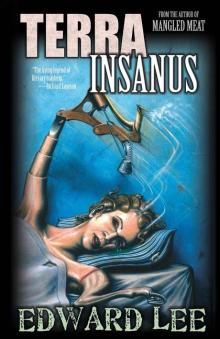 Terra Insanus
Terra Insanus The Stickmen
The Stickmen Flesh Gothic by Edward Lee
Flesh Gothic by Edward Lee Family Tradition
Family Tradition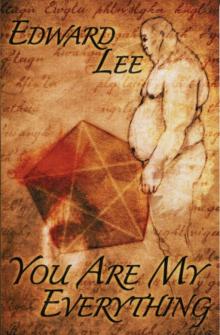 You Are My Everything
You Are My Everything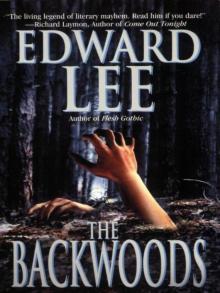 The Backwoods
The Backwoods The Teratologist
The Teratologist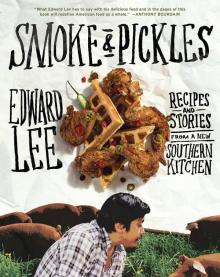 Smoke and Pickles
Smoke and Pickles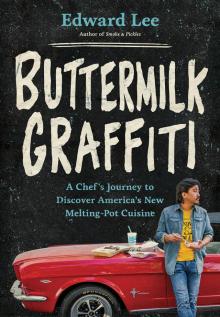 Buttermilk Graffiti
Buttermilk Graffiti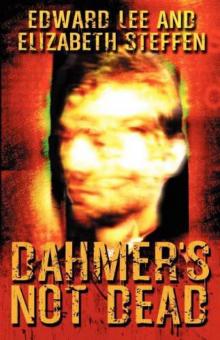 Dahmer's Not Dead
Dahmer's Not Dead Quest for Sex, Truth & Reality
Quest for Sex, Truth & Reality The Innswich Horror
The Innswich Horror Brides Of The Impaler
Brides Of The Impaler Goon
Goon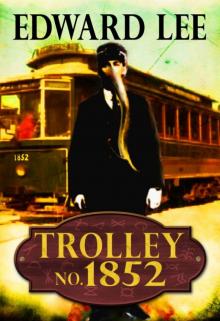 Trolley No. 1852
Trolley No. 1852 Sacrifice
Sacrifice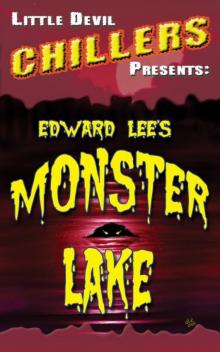 Monster Lake
Monster Lake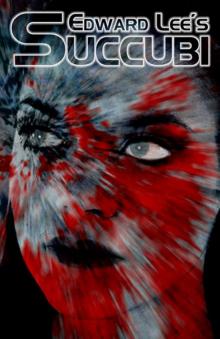 Succubi
Succubi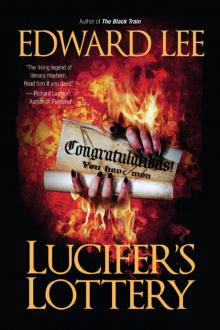 Lucifer's Lottery
Lucifer's Lottery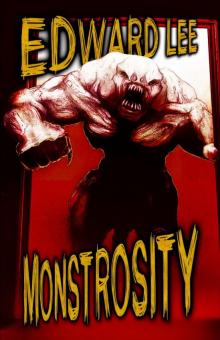 Monstrosity
Monstrosity The House
The House The Dunwich Romance
The Dunwich Romance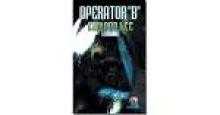 Operator B
Operator B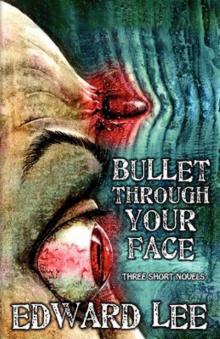 Bullet Through Your Face (improved format)
Bullet Through Your Face (improved format)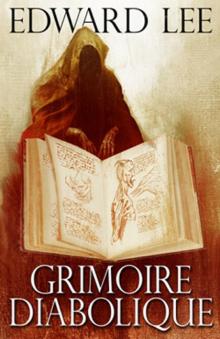 Grimoire Diabolique
Grimoire Diabolique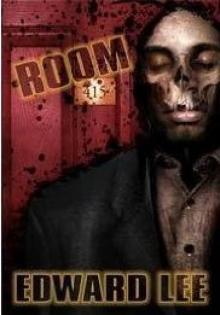 Room 415
Room 415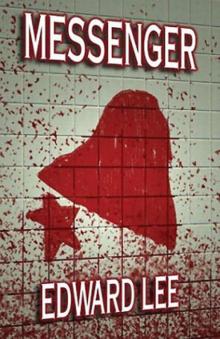 The Messenger (2011 reformat)
The Messenger (2011 reformat)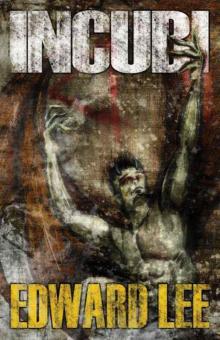 Incubi
Incubi The Black Train
The Black Train House Infernal by Edward Lee
House Infernal by Edward Lee City Infernal
City Infernal Creekers
Creekers The Haunter Of The Threshold
The Haunter Of The Threshold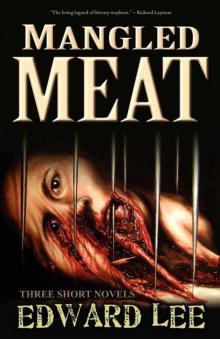 Mangled Meat
Mangled Meat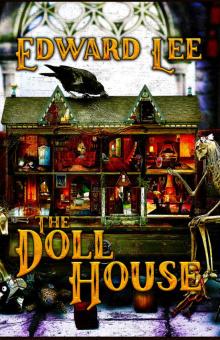 The Doll House
The Doll House Header 2
Header 2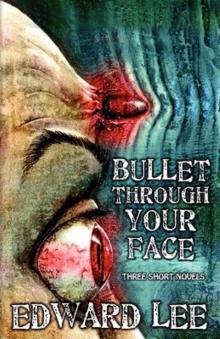 Bullet Through Your Face (reformatted)
Bullet Through Your Face (reformatted)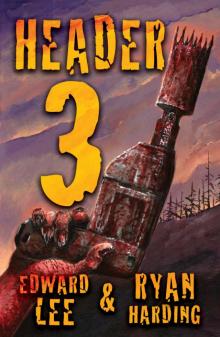 Header 3
Header 3 Infernal Angel
Infernal Angel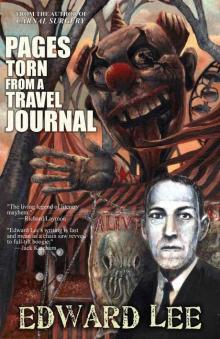 Pages Torn From a Travel Journal
Pages Torn From a Travel Journal Edward Lee: Selected Stories
Edward Lee: Selected Stories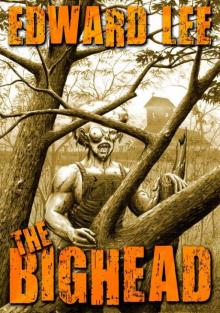 The Bighead
The Bighead The Chosen
The Chosen